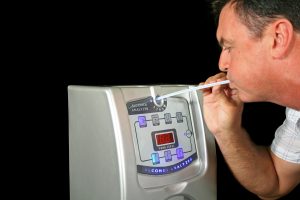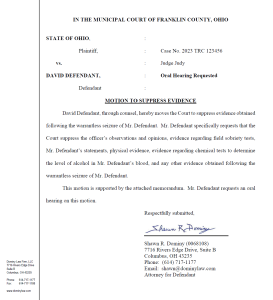 A truck driver hauling 43,000 pounds of beer was charged with DUI (called ‘OVI’ in Ohio). According to KRCR TV, the driver’s blood alcohol content was ‘over the limit’ for both commercial drivers and non-commercial drivers. While the irony of a beer deliverer being charged with DUI may sound comical, a commercial driver would find nothing funny about being charged with OVI. For holders of a commercial driver’s license (CDL), the rules related to OVI are strict, and the consequences are severe.
A truck driver hauling 43,000 pounds of beer was charged with DUI (called ‘OVI’ in Ohio). According to KRCR TV, the driver’s blood alcohol content was ‘over the limit’ for both commercial drivers and non-commercial drivers. While the irony of a beer deliverer being charged with DUI may sound comical, a commercial driver would find nothing funny about being charged with OVI. For holders of a commercial driver’s license (CDL), the rules related to OVI are strict, and the consequences are severe.
Articles Tagged with Ohio DUI Cases
DUI/OVI and Improperly Handling Firearms in Ohio
 Muhammad Wilkerson, former defensive end for the New York Jets, was arrested for Operating a Vehicle under the Influence and Unlawful Possession of a Loaded handgun. Wilkerson’s arrest occurred in New Jersey. If Wilkerson were arrested for these offenses in Ohio, he would be charged with OVI and Improperly Handling Firearms in a Motor Vehicle. This article describes the elements, court process, and potential penalties for these offenses in Ohio.
Muhammad Wilkerson, former defensive end for the New York Jets, was arrested for Operating a Vehicle under the Influence and Unlawful Possession of a Loaded handgun. Wilkerson’s arrest occurred in New Jersey. If Wilkerson were arrested for these offenses in Ohio, he would be charged with OVI and Improperly Handling Firearms in a Motor Vehicle. This article describes the elements, court process, and potential penalties for these offenses in Ohio.
Some Allegations of Breath Test Refusals Are Unfair
 Ohio’s DUI laws (called ‘OVI’ in Ohio) criminalize driving with a prohibited breath alcohol concentration. To determine whether a person has a prohibited breath alcohol concentration, law enforcement officers use breath-testing machines. If a person refuses a breath test, there are consequences. However, differences in height, age, gender, and smoking habits make some people physically unable to provide a sufficient breath sample. As a result, some people are accused of refusing a breath test when they didn’t.
Ohio’s DUI laws (called ‘OVI’ in Ohio) criminalize driving with a prohibited breath alcohol concentration. To determine whether a person has a prohibited breath alcohol concentration, law enforcement officers use breath-testing machines. If a person refuses a breath test, there are consequences. However, differences in height, age, gender, and smoking habits make some people physically unable to provide a sufficient breath sample. As a result, some people are accused of refusing a breath test when they didn’t.
Inventory Searches and DUI/OVI in Ohio
 Following a DUI arrest (called ‘OVI’ in Ohio), it is common for an officer to search the suspect’s vehicle before having the vehicle towed. This ‘inventory search’ is an exception to the general requirement of a search warrant. For an inventory search to be valid, it must be done in accordance with the policy of the law enforcement agency. A recent case decided by the Ohio Supreme Court addressed what evidence is necessary to prove the search complied with the law enforcement agency’s policy. Continue Reading
Following a DUI arrest (called ‘OVI’ in Ohio), it is common for an officer to search the suspect’s vehicle before having the vehicle towed. This ‘inventory search’ is an exception to the general requirement of a search warrant. For an inventory search to be valid, it must be done in accordance with the policy of the law enforcement agency. A recent case decided by the Ohio Supreme Court addressed what evidence is necessary to prove the search complied with the law enforcement agency’s policy. Continue Reading
Defendant’s Medical Records Cannot Be Subpoenaed for Ohio DUI/OVI Cases
 As Dominy Law Firm attorney Bryan Hawkins was preparing to litigate this issue in Franklin County, Ohio, an appeals court settled it. The issue is whether, in a DUI case (called ‘OVI’ in Ohio), a law enforcement officer can obtain the medical records of a suspect with a subpoena and without a search warrant. In the case of State v. Rogers, the Tenth District Court of Appeals held law enforcement’s procurement of an OVI suspect’s medical records without a search warrant violates the suspect’s Fourth Amendment right to be free from unreasonable searches and seizures.
As Dominy Law Firm attorney Bryan Hawkins was preparing to litigate this issue in Franklin County, Ohio, an appeals court settled it. The issue is whether, in a DUI case (called ‘OVI’ in Ohio), a law enforcement officer can obtain the medical records of a suspect with a subpoena and without a search warrant. In the case of State v. Rogers, the Tenth District Court of Appeals held law enforcement’s procurement of an OVI suspect’s medical records without a search warrant violates the suspect’s Fourth Amendment right to be free from unreasonable searches and seizures.
How Does a DUI/OVI in Ohio Affect Employment?
 Following his recent arrest for DUI (called ‘OVI’ in Ohio), Bob Huggins resigned from his position as the men’s basketball coach at West Virginia University. His situation is illustrative of many high-profile individuals who have lost jobs due to a DUI/OVI. But it is not only high-profile individuals who face employment consequences for OVI cases. We are frequently asked the following questions about OVI cases and employment.
Following his recent arrest for DUI (called ‘OVI’ in Ohio), Bob Huggins resigned from his position as the men’s basketball coach at West Virginia University. His situation is illustrative of many high-profile individuals who have lost jobs due to a DUI/OVI. But it is not only high-profile individuals who face employment consequences for OVI cases. We are frequently asked the following questions about OVI cases and employment.
What is Sufficient Proof of Drugged Driving in Ohio?
 When a driver is prosecuted for operating a vehicle under the influence of drugs (called ‘OVI’ in Ohio), what evidence is sufficient to sustain a conviction? The prosecution must prove the defendant operated a vehicle under the influence of a drug of abuse. That requires the prosecution to prove the defendant was impaired while operating the vehicle, identify the specific drug which was ingested, and link the drug’s ingestion to the defendant’s impairment.
When a driver is prosecuted for operating a vehicle under the influence of drugs (called ‘OVI’ in Ohio), what evidence is sufficient to sustain a conviction? The prosecution must prove the defendant operated a vehicle under the influence of a drug of abuse. That requires the prosecution to prove the defendant was impaired while operating the vehicle, identify the specific drug which was ingested, and link the drug’s ingestion to the defendant’s impairment.
Motions To Suppress Evidence in Ohio DUI / OVI Cases
 I recently came across this article in an Ohio newspaper: Judge Denies Motion to Suppress Evidence. What does that mean in a DUI case (called ‘OVI’ in Ohio)? When a judge orders that evidence is suppressed, the evidence is excluded from trial. That means, even though the evidence existed, the jury does not hear about it. The two general bases for suppressing evidence are: (1) violations of the defendant’s Constitutional rights; and (2) the government’s failure to comply with statutory (legislative) law.
I recently came across this article in an Ohio newspaper: Judge Denies Motion to Suppress Evidence. What does that mean in a DUI case (called ‘OVI’ in Ohio)? When a judge orders that evidence is suppressed, the evidence is excluded from trial. That means, even though the evidence existed, the jury does not hear about it. The two general bases for suppressing evidence are: (1) violations of the defendant’s Constitutional rights; and (2) the government’s failure to comply with statutory (legislative) law.
Repeat DUI /OVI Offenses in Ohio
 According to a story by NBC4i, the Ohio State Highway Patrol reports that 30% of DUI arrests (called ‘OVI’ in Ohio’) come from repeat offenders. In Ohio, the mandatory OVI penalties increase with every conviction in ten-years (called the ‘lookback period’). Those penalties include vehicle sanctions, license suspensions, incarceration, and other consequences.
According to a story by NBC4i, the Ohio State Highway Patrol reports that 30% of DUI arrests (called ‘OVI’ in Ohio’) come from repeat offenders. In Ohio, the mandatory OVI penalties increase with every conviction in ten-years (called the ‘lookback period’). Those penalties include vehicle sanctions, license suspensions, incarceration, and other consequences.
No Contest Pleas in Ohio DUI/OVI Cases
 Rejecting a No Contest plea may be an abuse of a judge’s discretion, according to a case decided last week by the Ohio Supreme Court. A plea of No Contest is different than a guilty plea, and the plea of No Contest is used for two purposes in DUI (called ‘OVI’ in Ohio) cases. Although a judge’s approval is required for a plea of No Contest, the case decided last week makes it clear a judge’s refusal to give approval may be overturned.
Rejecting a No Contest plea may be an abuse of a judge’s discretion, according to a case decided last week by the Ohio Supreme Court. A plea of No Contest is different than a guilty plea, and the plea of No Contest is used for two purposes in DUI (called ‘OVI’ in Ohio) cases. Although a judge’s approval is required for a plea of No Contest, the case decided last week makes it clear a judge’s refusal to give approval may be overturned.
Continue Reading
 Columbus OVI/DUI Attorney Blog
Columbus OVI/DUI Attorney Blog

